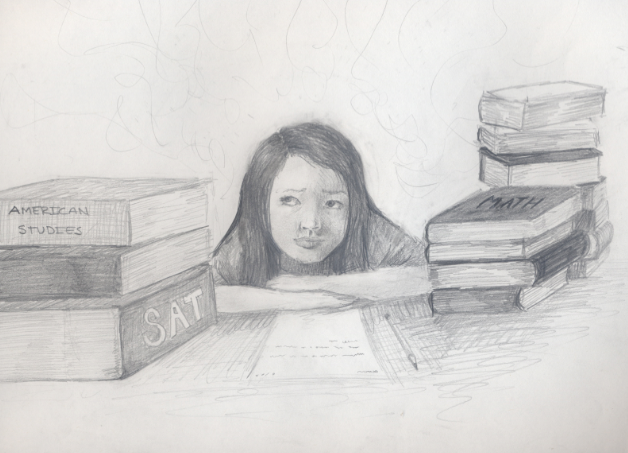“I think someone once told me if I made it through junior year, I could make it through anything,” recalls Claudia Freeman, current senior and President of the Student Body. For BC Students The eleventh grade is noted for heralding an increased workload and the the interdisciplinary course unique to junior year: American Studies. Time for obsessing over TV shows, spending free periods with friends and laughing off college becomes a thing of the past; the future is brought unnervingly to your doorstep and with it comes the stress and tension of facing that future. Thus, the fears of new juniors have some seeds of legitimacy, but once they get into the flow of things, they say maybe this isn’t so bad! As current junior Emma Newbery says: “There has been a lot of work so far, but it hasn’t been as much as people have said in the past, and it’s pretty manageable. I heard that it was going to be really difficult, but I think there’s a lot of hype surrounding junior year.” As Emma points out the mythical stories of junior year, where teachers hate you because you said something silly once, or when you pull all-nighters to finish an American Studies paper or when the stress about college gets to you and you have a nervous breakdown are all lies! But when the stress does get to you some advice from a few level headed seniors might help put things in perspective
Worrying about American Studies and its accompanying workload seems to characterize most of junior year’s woes. Georgia Horton, current senior and Head of the Lion’s Pride Club at BC, talked about the stories she had heard before entering junior year. “I heard the rumors that it was the toughest and most important year of high school,” she explains. “Since you’re doing the nitty-gritty details of the college process [like studying for the SAT / ACT, college touring] it can get very overwhelming since the final result [ of being in college] is SO far away.” Ethan Marcopolous echoed Georgia’s sentiments: “Junior year was supposed to be the hardest year of high school, so I went into it nervous.” Punctuating this less-than-encouraging hype about junior year being ‘the worst year of high school’ was the abiding fear of American Studies class. “American Studies is definitely a shift,” says Georgia smilingly. “You need to alter how you carry yourself in class. If you’re a quiet student who normally takes notes, you need to push yourself …to do better!” Ricky Fernandez, current senior and Head of P.O.C. Club, also gives a few strategies for preparing: “Some practical advice would be to plan way ahead of deadlines, especially in an interdisciplinary course like American studies.” Others suggest immersing yourself in the class and making sure you stand out. Who knows? The course might even end up being a positive experience. “I enjoyed American Studies,” recalls Ethan. “I went into thinking that English and History together would hurt my favorite class, which is History, but instead the historical part of the class overpowered the English for the most part.” Emil Baccash’s last bit of advice serves as a pithy understanding of an important part of both high school and junior year: “Don’t procrastinate. I dealt with that the hard way.”
Another, perhaps more realistic fear, is that of the college process. Juniors are quick to stress about the pressures of the future and freak out about the PSAT or all the college touring, but current seniors say that all that stress isn’t necessary. Everything will fall into its place of its accord and worrying will solve nothing. “Don’t get too preoccupied with the college process,” advises Olivia Cucinotta. “There’s a lot of really cool opportunities, both in school and outside of school.” Mr. Brandon Clarke, College Counselor and Director of Global Education at BC provides calming sentiments as well on the matter of college: “All Berkeley Carroll students, by virtue of their excellent education, go on to attend the country’s best colleges, universities, technical institutions and arts conservatories. The options out there are incredible! And in junior year, the college process is all about exploring and thinking about where you want to spend the next four years meeting amazing people your age, where someone else cooks and cleans for you, you have no curfew, and where really smart and interesting experts help you see the world in all kinds of new ways.” Seeing as Mr. Clarke has had a world of experience in all things college, his words speak volumes about the post-high school experience that seems to rattle juniors the most. With regard to standardized testing, seniors and college counselors alike say the same thing: manage your time well, and you will reap the benefits of a little hard work. “You have SAT’s later on in the year,” Ethan says. “So just give yourself time for everything… practice time management, and you will be chill.” Mr. Clarke counsels prospective college students, so he’s privy to the best strategies for attacking standardized testing. “Develop a plan for test prep, preferably one that places most of the emphasis on the winter. By spring, just as you’re beginning to visit colleges (most juniors start over spring break), you should transition to taking practice tests to reinforce the strategies that you’ve learned.”
On the subject of junior year and college, I myself must admit that I had a late start. I fell prey to the enticing voice of procrastination and hurried through my schoolwork, all the while lifting my haunches in preparation for ‘deciding my future’, i.e., applying to college. Now that I am utterly enmeshed in the work and play of senior year, my junior year troubles seem slightly over-anxious and overthought. I couldn’t enjoy junior year as much, mostly because I spent most of my time griping and worrying; don’t make the same mistake I did, juniors. As Mr. Clarke says about the possibilities of junior year and the choices we will make as we search for our futures: “Embrace the opportunity, because life doesn’t grant us many privileges as extraordinary as this one.”


